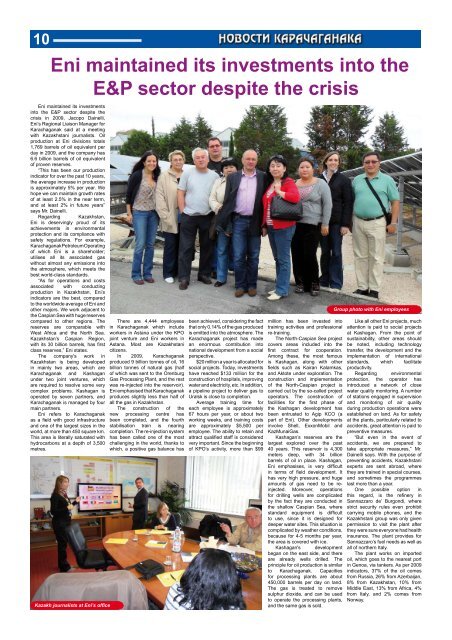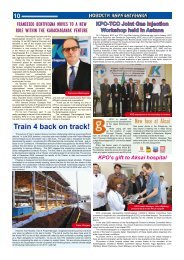January 2011 - Karachaganak petroleum operating
January 2011 - Karachaganak petroleum operating
January 2011 - Karachaganak petroleum operating
Create successful ePaper yourself
Turn your PDF publications into a flip-book with our unique Google optimized e-Paper software.
10<br />
Eni maintained its investments into the<br />
Eni maintained its investments<br />
into the E&P sector despite the<br />
crisis in 2009, Jacopo Dainelli,<br />
Eni’s Regional Liaison Manager for<br />
<strong>Karachaganak</strong> said at a meeting<br />
with Kazakhstani journalists. Oil<br />
production at Eni divisions totals<br />
1,769 barrels of oil equivalent per<br />
day in 2009, and the company has<br />
6.6 billion barrels of oil equivalent<br />
of proven reserves.<br />
“This has been our production<br />
indicator for over the past 10 years,<br />
the average increase in production<br />
is approximately 5% per year. We<br />
hope we can maintain growth rates<br />
of at least 2.5% in the near term,<br />
and at least 2% in future years”<br />
says Mr. Dainelli.<br />
Regarding Kazakhstan,<br />
Eni is deservingly proud of its<br />
achievements in environmental<br />
protection and its compliance with<br />
safety regulations. For example,<br />
<strong>Karachaganak</strong> Petroleum Operating<br />
of which Eni is a shareholder;<br />
utilises all its associated gas<br />
without almost any emissions into<br />
the atmosphere, which meets the<br />
best world-class standards.<br />
“As for operations and costs<br />
associated with conducting<br />
production in Kazakhstan, Eni’s<br />
indicators are the best, compared<br />
to the worldwide average of Eni and<br />
other majors. We work adjacent to<br />
the Caspian Sea with huge reserves<br />
compared to other regions. The<br />
reserves are comparable with<br />
West Africa and the North Sea.<br />
Kazakhstan’s Caspian Region,<br />
with its 30 billion barrels, has first<br />
class reserves,” Eni states.<br />
The company's work in<br />
Kazakhstan is being developed<br />
in mainly two areas, which are<br />
<strong>Karachaganak</strong> and Kashagan<br />
under two joint ventures, which<br />
are required to resolve some very<br />
complex problems. Kashagan is<br />
operated by seven partners, and<br />
<strong>Karachaganak</strong> is managed by four<br />
main partners.<br />
Eni refers to <strong>Karachaganak</strong><br />
as a field with good infrastructure<br />
and one of the largest sizes in the<br />
world, at more than 450 square km.<br />
This area is literally saturated with<br />
hydrocarbons at a depth of 3,500<br />
metres.<br />
Kazakh journalists at Eni’s office<br />
E&P sector despite the crisis<br />
There are 4,444 employees<br />
in <strong>Karachaganak</strong> which include<br />
workers in Astana under the KPO<br />
joint venture and Eni workers in<br />
Astana. Most are Kazakhstani<br />
citizens.<br />
In 2009, <strong>Karachaganak</strong><br />
produced 9 billion tonnes of oil, 16<br />
billion tonnes of natural gas (half<br />
of which was sent to the Orenburg<br />
Gas Processing Plant, and the rest<br />
was re-injected into the reservoir).<br />
Eni emphasised that <strong>Karachaganak</strong><br />
produces slightly less than half of<br />
all the gas in Kazakhstan.<br />
The construction of the<br />
new processing centre has<br />
been completed, and the fourth<br />
stabilisation train is nearing<br />
completion. The re-injection system<br />
has been called one of the most<br />
challenging in the world, thanks to<br />
which, a positive gas balance has<br />
been achieved, considering the fact<br />
that only 0.14% of the gas produced<br />
is emitted into the atmosphere. The<br />
<strong>Karachaganak</strong> project has made<br />
an enormous contribution into<br />
national development from a social<br />
perspective.<br />
$20 million a year is allocated for<br />
social projects. Today, investments<br />
have reached $133 million for the<br />
construction of hospitals, improving<br />
water and electricity, etc. In addition,<br />
a pipeline project to deliver gas to<br />
Uralsk is close to completion.<br />
Average training time for<br />
each employee is approximately<br />
67 hours per year, or about two<br />
working weeks, and training costs<br />
are approximately $5,500 per<br />
employee. The ability to retain and<br />
attract qualified staff is considered<br />
very important. Since the beginning<br />
of KPO’s activity, more than $99<br />
million has been invested into<br />
training activities and professional<br />
re-training.<br />
The North-Caspian Sea project<br />
covers areas included into the<br />
first contract for cooperation.<br />
Among these, the most famous<br />
is Kashagan, along with other<br />
fields such as Kairan Kalamkas,<br />
and Aktote under exploration. The<br />
construction and implementation<br />
of the North-Caspian project is<br />
carried out by the so-called project<br />
operators. The construction of<br />
facilities for the first phase of<br />
the Kashagan development has<br />
been entrusted to Agip KCO (a<br />
part of Eni). Other developments<br />
involve Shell, ExxonMobil and<br />
KazMunaiGas.<br />
Kashagan’s reserves are the<br />
largest explored over the past<br />
40 years. This reservoir is 4,300<br />
meters deep, with 34 billion<br />
barrels of oil in place. Kashagan,<br />
Eni emphasises, is very difficult<br />
in terms of field development. It<br />
has very high pressure, and huge<br />
amounts of gas need to be reinjected.<br />
Moreover, operations<br />
for drilling wells are complicated<br />
by the fact they are conducted in<br />
the shallow Caspian Sea, where<br />
standard equipment is difficult<br />
to use, since it is designed for<br />
deeper water sites. This situation is<br />
complicated by weather conditions,<br />
because for 4-5 months per year,<br />
the area is covered with ice.<br />
Kashagan's development<br />
began on the east side, and there<br />
are already wells drilled. The<br />
principle for oil production is similar<br />
to <strong>Karachaganak</strong>. Capacities<br />
for processing plants are about<br />
450,000 barrels per day on land.<br />
The gas is treated to remove<br />
sulphur dioxide, and can be used<br />
to operate the processing plants,<br />
and the same gas is sold.<br />
Group photo with Eni employees<br />
Like all other Eni projects, much<br />
attention is paid to social projects<br />
at Kashagan. From the point of<br />
sustainability, other areas should<br />
be noted, including technology<br />
transfer, the development and the<br />
implementation of international<br />
standards, which facilitate<br />
productivity.<br />
Regarding environmental<br />
protection, the operator has<br />
introduced a network of close<br />
water quality monitoring. A number<br />
of stations engaged in supervision<br />
and monitoring of air quality<br />
during production operations were<br />
established on land. As for safety<br />
at the plants, particularly related to<br />
accidents, great attention is paid to<br />
preventive measures.<br />
“But even in the event of<br />
accidents, we are prepared to<br />
take appropriate measures,” Mr.<br />
Dainelli says. With the purpose of<br />
preventing accidents, Kazakhstani<br />
experts are sent abroad, where<br />
they are trained in special courses,<br />
and sometimes the programmes<br />
last more than a year.<br />
One possible option in<br />
this regard, is the refinery in<br />
Sannazzaro de’ Burgondi, where<br />
strict security rules even prohibit<br />
carrying mobile phones, and the<br />
Kazakhstani group was only given<br />
permission to visit the plant after<br />
they were sure everyone had health<br />
insurance. The plant provides for<br />
Sannazzaro’s fuel needs as well as<br />
all of northern Italy.<br />
The plant works on imported<br />
oil, which goes to the nearest port<br />
in Genoa, via tankers. As per 2009<br />
indicators, 37% of the oil comes<br />
from Russia, 26% from Azerbaijan,<br />
8% from Kazakhstan, 10% from<br />
Middle East, 13% from Africa, 4%<br />
from Italy, and 2% comes from<br />
Norway.
EDITORIAL<br />
“<strong>Karachaganak</strong> News” would like to take this opportunity to<br />
congratulate its readers on the New <strong>2011</strong> Year. We also would like<br />
to say a huge THANK YOU to all of our readers and to everyone who<br />
expressed support of our newspaper production in the Year 2010.<br />
We hope you will continue doing this in the year <strong>2011</strong>.<br />
We are very pleased to inform you that this year we are planning<br />
to issue additional four pages of “<strong>Karachaganak</strong> News” in Kazakh.<br />
Thus, KPO will continue to support the development of the Kazakh<br />
language.<br />
“<strong>Karachaganak</strong> News” is issued by KPO’s External Affairs<br />
department. We offer you the latest information and news on events<br />
taking place in the <strong>Karachaganak</strong> field, KPO’s new projects and the<br />
company’s contribution to the social and economic development of<br />
the region. This year we will keep covering the latest and the most<br />
important events taking place here in Aksai and across other parts<br />
of our business.<br />
KPO’s management and personnel, parent-companies, and<br />
other organizations we work with as well as people of neighboring<br />
villages take a favorable view of “<strong>Karachaganak</strong> News”. It is obvious<br />
that such information bulletin is appreciated and we will do our best<br />
to make it even more informative and interesting in the year <strong>2011</strong>.<br />
We would like you to be involved in helping us produce<br />
“<strong>Karachaganak</strong> News”. If you have ideas or like to submit a story,<br />
you can contact the editor of “<strong>Karachaganak</strong> News” Askar Tapalov<br />
at the KPO Aksai office.<br />
Once again, please accept our congratulation with the New Year.<br />
Let the year <strong>2011</strong> bring the fulfilment of your most daring plans and<br />
ideas. We wish you and your beloved ones robust health, happiness<br />
and wellbeing!<br />
Merry Christmas and Happy New Year!<br />
KMG EP enters Platts<br />
Top 250 Global Energy<br />
Companies Rankings<br />
JSC KazMunaiGas Exploration Production (KMG EP) has been<br />
ranked 47th out of 91 Exploration & Production companies in EMEA<br />
(Europe, Middle East, Africa) and has achieved a ranking of 101 on<br />
overall global performance according to the Platts Top 250 Global Energy<br />
Companies Rankings.<br />
KMG EP has become the first company from Kazakhstan to feature<br />
in the Platts Global Rankings.<br />
The Platts Top 250 Global Energy Companies Rankings are based on<br />
a combination of assets, revenues, profits and return on invested capital.<br />
To be ranked, companies also must have assets greater than US$3bn,<br />
and must be publicly listed.<br />
The CEO of KMG EP, Kenzhebek Ibrashev, said: “KMG EP is<br />
proud to become the first company from Kazakhstan to feature in the<br />
Platts Global Rankings. We are pleased that everyone’s hard work has<br />
achieved international recognition. We will continue to grow and improve<br />
our performance for the benefit of all our stakeholders.”<br />
KMG office in Astana<br />
In November, 2010, on the initiative of the<br />
Ministry of Labour and Social Welfare and<br />
the Ministry of Oil and Gas of the Republic of<br />
Kazakhstan the international workshop titled<br />
“Safety in the oil and gas industry. Occupational<br />
safety and health of workers in the oil and gas<br />
companies” was held in Atyrau.<br />
Along with the representatives of oil and<br />
gas companies who arrived in Atyrau from<br />
Twenty three Kazakh<br />
employees representing KPO from<br />
Well Operations and HSE have<br />
completed the NEBOSH Certificate<br />
Programme. In addition, eighteen<br />
KPO employees have successfully<br />
completed IOSH STEP programme.<br />
(IOSH – Institute of Occupational<br />
Safety and Health).<br />
On this occasion, NEBOSH &<br />
IOSH STEP Graduation & Awards<br />
Ceremony was held at the Renco<br />
Hotel in Aksai. Graduates were<br />
presented with certificates by<br />
KPO HR Controller Ken Lynch<br />
and KPO Field Safety Manager<br />
Vyacheslav Yusupov. During the<br />
Award Ceremony it was noted that<br />
increasingly, safety professionals<br />
have responsibility for a broad<br />
range of areas, including safety<br />
and environmental issues within<br />
their organisations.<br />
The NEBOSH Certificate is an<br />
ideal professional level qualification<br />
and is intended primarily for<br />
those responsible for safety &<br />
environmental issues. NEBOSH<br />
offers a wide range of qualifications<br />
11<br />
KPO attends seminar in Atyrau<br />
Switzerland, Norway, Belgium, the Netherlands,<br />
Italy, Russia, China, the USA, and Canada, the<br />
workshop was also attended by KPO delegation<br />
led by KPO Risk Manager Riccardo Bandini.<br />
During the two day seminar, Riccardo Bandini<br />
presented the audience “KPO Risk Assessment<br />
and Safe Work Practices” focusing on KPO key<br />
areas to reduce risks and ensure success in<br />
Safe Work Practices.<br />
National staff receives<br />
NEBOSH&IOSH STEP certificates<br />
that provide the perfect grounding<br />
for a career in health and safety.<br />
The NEBOSH National Certificate<br />
is a prestigious and demanding<br />
professional qualification for those<br />
wanting to further their career in<br />
Occupational Health and Safety<br />
Practice.<br />
In his speech Ken Lynch noted<br />
that the education and professional<br />
development of Kazakh staff is one<br />
of KPO’s main priorities. He said:<br />
“These programs allow employees<br />
to obtain the knowledge and skills<br />
necessary for further professional<br />
growth and development.”<br />
According to the organisers<br />
of the programmes, the NEBOSH<br />
certificate is an ideal professional<br />
level qualification and is intended<br />
primarily for those responsible for<br />
safety & environmental issues.<br />
NEBOSH offers a wide range<br />
of qualifications that provide the<br />
perfect grounding for a career in<br />
health and safety.<br />
The NEBOSH National<br />
Certificate is a prestigious<br />
and demanding professional<br />
During the workshop in Atyrau<br />
qualification for those wanting to<br />
further their career in Occupational<br />
Health and Safety Practice.<br />
Firmly established as the UK's<br />
leading qualification for health<br />
and safety professionals, the<br />
NEBOSH Certificate is rapidly<br />
being recognised internationally<br />
as the standard for health and<br />
safety professionals. It is designed<br />
exclusively for those working<br />
outside the UK, and is also available<br />
Ken Lynch and Vyacheslav Yusupov at the Graduation Ceremony<br />
to multinational companies for their<br />
overseas operations, ensuring a<br />
consistent approach across the<br />
organisation.<br />
At the end of the ceremony,<br />
KPO employees who attended<br />
NEBOSH & IOSH STEP<br />
programmes said that they would<br />
like to pass on their thanks to<br />
organisers of this Programmes for<br />
the excellent training that they had<br />
received at KPO’s Training Centre.<br />
They also pointed out that they<br />
would definitely recommend this<br />
Programmes to anyone hoping<br />
to enter into the world of health &<br />
safety.





